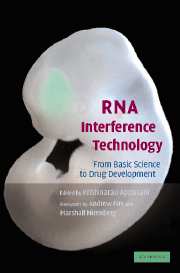Book contents
- Frontmatter
- Contents
- Foreword by Andrew Fire
- Foreword by Marshall Nirenberg
- List of Contributors
- Introduction
- Section one Basic RNAi, siRNA, microRNAs and gene-silencing mechanisms
- Section two Design, synthesis of siRNAs
- Section three Vector development and in vivo, in vitro and in ovo delivery methods
- Section four Gene silencing in model organisms
- Section five Drug target validation
- 22 Delivering siRNA in vivo for functional genomics and novel therapeutics
- 23 The role of RNA interference in drug target validation: Application to Hepatitis C
- 24 RNAi and the drug discovery process
- 25 RNA interference technology in the discovery and validation of druggable targets
- Section six Therapeutic and drug development
- Section seven High-throughput genome-wide RNAi analysis
- Index
- Plate section
- References
24 - RNAi and the drug discovery process
Published online by Cambridge University Press: 31 July 2009
- Frontmatter
- Contents
- Foreword by Andrew Fire
- Foreword by Marshall Nirenberg
- List of Contributors
- Introduction
- Section one Basic RNAi, siRNA, microRNAs and gene-silencing mechanisms
- Section two Design, synthesis of siRNAs
- Section three Vector development and in vivo, in vitro and in ovo delivery methods
- Section four Gene silencing in model organisms
- Section five Drug target validation
- 22 Delivering siRNA in vivo for functional genomics and novel therapeutics
- 23 The role of RNA interference in drug target validation: Application to Hepatitis C
- 24 RNAi and the drug discovery process
- 25 RNA interference technology in the discovery and validation of druggable targets
- Section six Therapeutic and drug development
- Section seven High-throughput genome-wide RNAi analysis
- Index
- Plate section
- References
Summary
Introduction
Drug discovery is a complex process that seeks to identify therapeutics for treating human disease. It has very high failure rate, and by one estimate, the total cost for a therapeutic successfully brought to market is 803 million dollars (DiMasi et al., 2003). Failure occurs at all points in the process, with failures at the pre-development stages being the most common, and failures at the clinical stages being the most costly. Scientists working in drug discovery are continually challenged to identify ways to improve the process. Current efforts are largely “target-based” approaches. Once chosen, the target may be studied in vitro for more than a year, and in model systems of the disease for up to four years. Errors in determining whether a given target is truly effective in treating a disease may not be detected until Phase II or Phase III clinical studies, which follow many years of study and a financial investment of tens or hundreds of millions of dollars. As such, target validation is a critical aspect of the drug discovery process.
The pharmaceutical industry has invested heavily in genomics because of its promise to provide a continuing supply of drug targets (Wiley, 1998; Ohlstein et al., 2000; Baba, 2001). Implicit in this investment has been the expectation that the targets provided by genomics are highly validated (Debouck and Metcalf, 2000). Thus, genomics has grown broadly across the drug discovery process, from target identification to phamacogenomics.
Information
- Type
- Chapter
- Information
- RNA Interference TechnologyFrom Basic Science to Drug Development, pp. 331 - 346Publisher: Cambridge University PressPrint publication year: 2005
References
Accessibility standard: Unknown
Why this information is here
This section outlines the accessibility features of this content - including support for screen readers, full keyboard navigation and high-contrast display options. This may not be relevant for you.Accessibility Information
- 3
- Cited by
